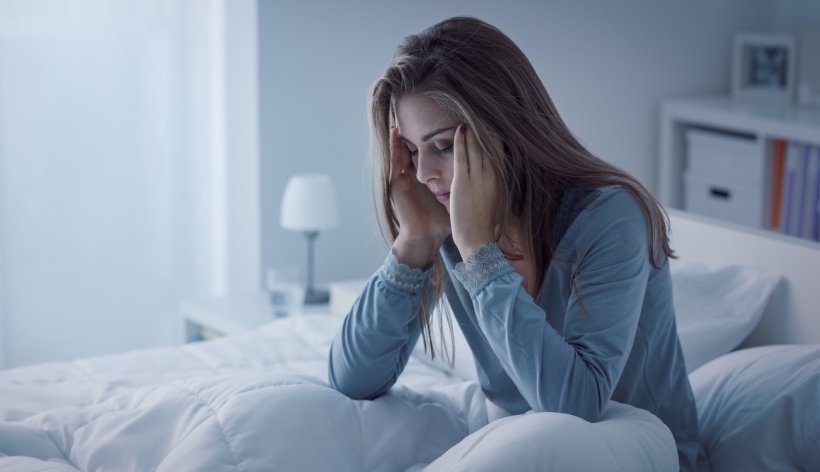
Image source: Adobe Stock/StockPhotoPro
News • Insomnia and high blood pressure in women
Losing sleep: a warning sign for hypertension?
New study from researchers at Brigham and Women’s Hospital highlights a correlation between symptoms of insomnia and high blood pressure in women.
Getting enough sleep has never been more difficult in today's fast-paced environment. Yet new research from investigators in the Channing Division of Network Medicine of Brigham and Women’s Hospital highlights why getting a good night’s sleep is critical to staying healthy. Their research unveils that women who struggled with getting enough sleep were at greater risk of developing hypertension, or high blood pressure. Results are published in the journal Hypertension.
"These findings suggest that individuals who struggle with symptoms of insomnia may be at risk of hypertension and could benefit from preemptive screening," explained Shahab Haghayegh, PhD, a research fellow at the Brigham and Harvard Medical School. "Hypertension is associated with many other physical and mental health complications. The sooner we can identify individuals with high blood pressure and treat them for it, the better we can mitigate future health issues."
Recommended article

News • Cardiovascular disease prevention
Why a good night's sleep can save your heart
In a new study, researchers at Lund University and Uppsala University have seen a clear connection between how long a person sleeps and a number of biomarkers linked to cardiometabolic diseases such as cardiovascular disease and type 2 diabetes.
Both hypertension and sleep disorders are becoming increasingly prevalent among adults in the United States. In fact, more than 35% of US adults do not get enough sleep at night, according to the Centers for Disease Control and Prevention. The American Academy of Sleep Medicine suggests that 30% of Americans experience symptoms of insomnia. Strikingly, 45% of US adults live with high blood pressure.
Haghayegh and colleagues followed 66,122 participants between 25 and 42 years of age in the Nurses' Health Study II (NHS2) cohort, all without hypertension at the study's onset, over sixteen years (from 2001 until 2017). Investigators collected information on participants’ age, race, body mass index (BMI), diet, lifestyle, physical activity, history of sleep apnea, and family history of hypertension and assessed the incidence of hypertension among the group every two years. They first began measuring sleep duration in 2001, then did so again in 2009, recording the average number of hours slept over a 24-hour period. They also tracked sleeping difficulties, such as having trouble falling or staying asleep or waking up early in the morning, collecting responses at several time points throughout the study.
Data analyses revealed that women with sleeping difficulties had higher BMIs, lower physical activity, and poorer diets, on average. Researcher also found that those who struggled with sleep were more likely to smoke and drink alcohol and have previously gone through menopause.
The American Academy of Sleep Medicine recommends sleeping seven or more hours a night, and if you cannot fall or stay asleep, it might be worth exploring why that is
Shahab Haghayegh
Among the 25,987 cases of hypertension documented over the follow-up, women who slept less than seven to eight hours a night had a significantly higher risk of developing hypertension, according to the data collected. Similarly, women who had trouble falling asleep and staying asleep were also more likely to develop hypertension. Waking up early in the morning was not associated with this increased risk. Notably, these associations, remained significant after controlling for participant shift work schedules (night versus day shifts) and chronotype (morningness versus eveningness).
While the exact nature of the relationship between sleep and risk of hypertension is unknown, Haghayegh said that sleep difficulties can lead to a chain of events that can increase sodium retention, arterial stiffness, and cardiac output, potentially leading to hypertension. Disruptions to the sleep/wake cycle can also influence blood vessel constriction/relaxation activity and the function of cells that regulate the vascular tone.
While this study only looked at the association between sleep and hypertension in women, researchers hope to expand their work to include men and non-binary participants. A second limitation is that researchers could only collect data on sleep quality at select time points throughout the study. Some of the study’s strengths include the larger number of participants and length of follow-up duration.
Haghayegh emphasizes that these findings do not indicate causality. He wants to understand why this association exists and how treating one condition may also treat the other. In future clinical studies, he aims to investigate if sleep medications could have a beneficial effect on blood pressure. "I hope these findings further underscore the crucial role of quality sleep in our overall well-being. The American Academy of Sleep Medicine recommends sleeping seven or more hours a night, and if you cannot fall or stay asleep, it might be worth exploring why that is," said Haghayegh. "This study highlights yet another reason why getting a good night's sleep is so important."
Source: Brigham and Women’s Hospital
07.10.2023




